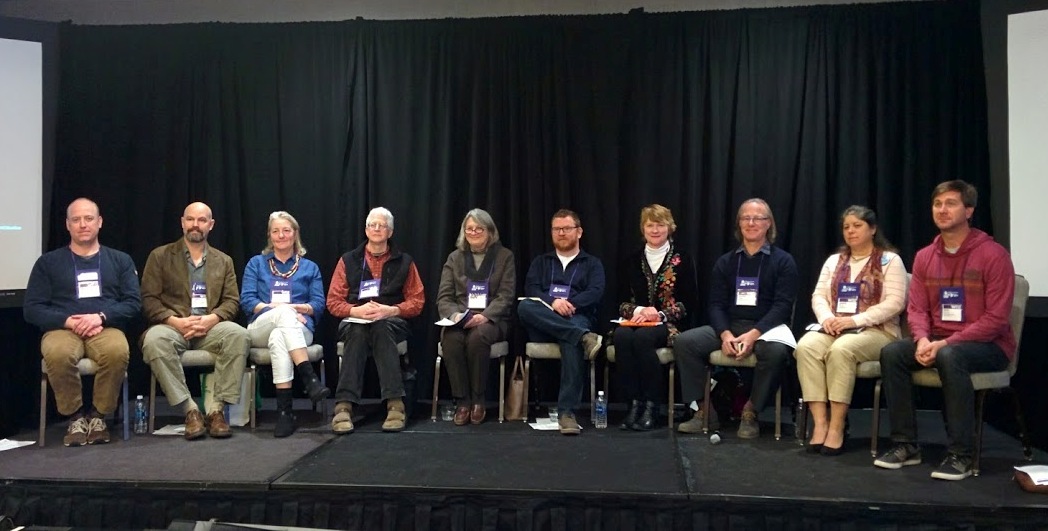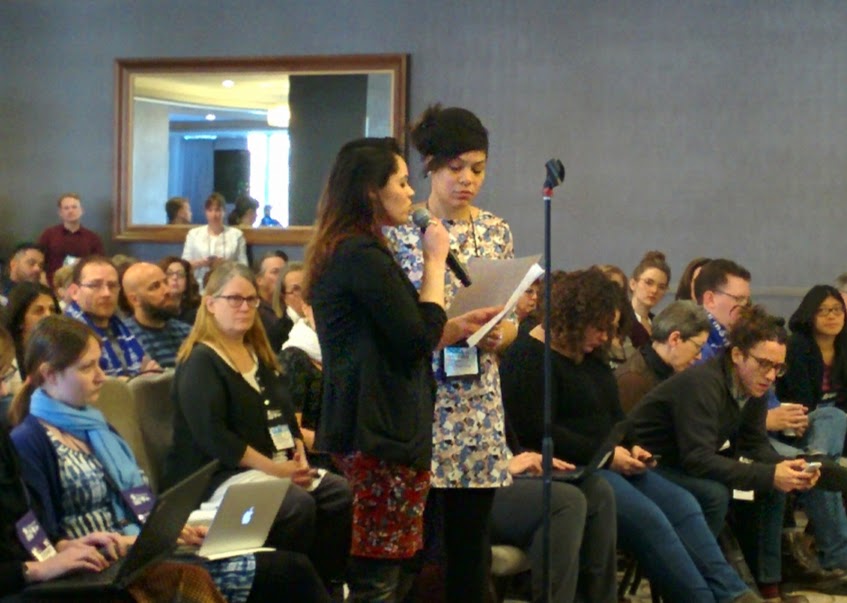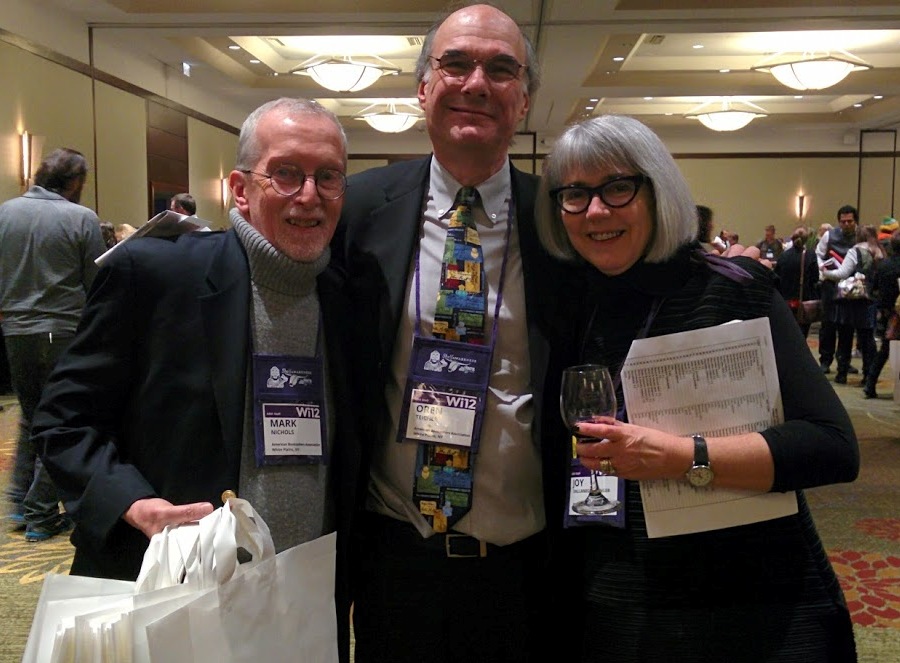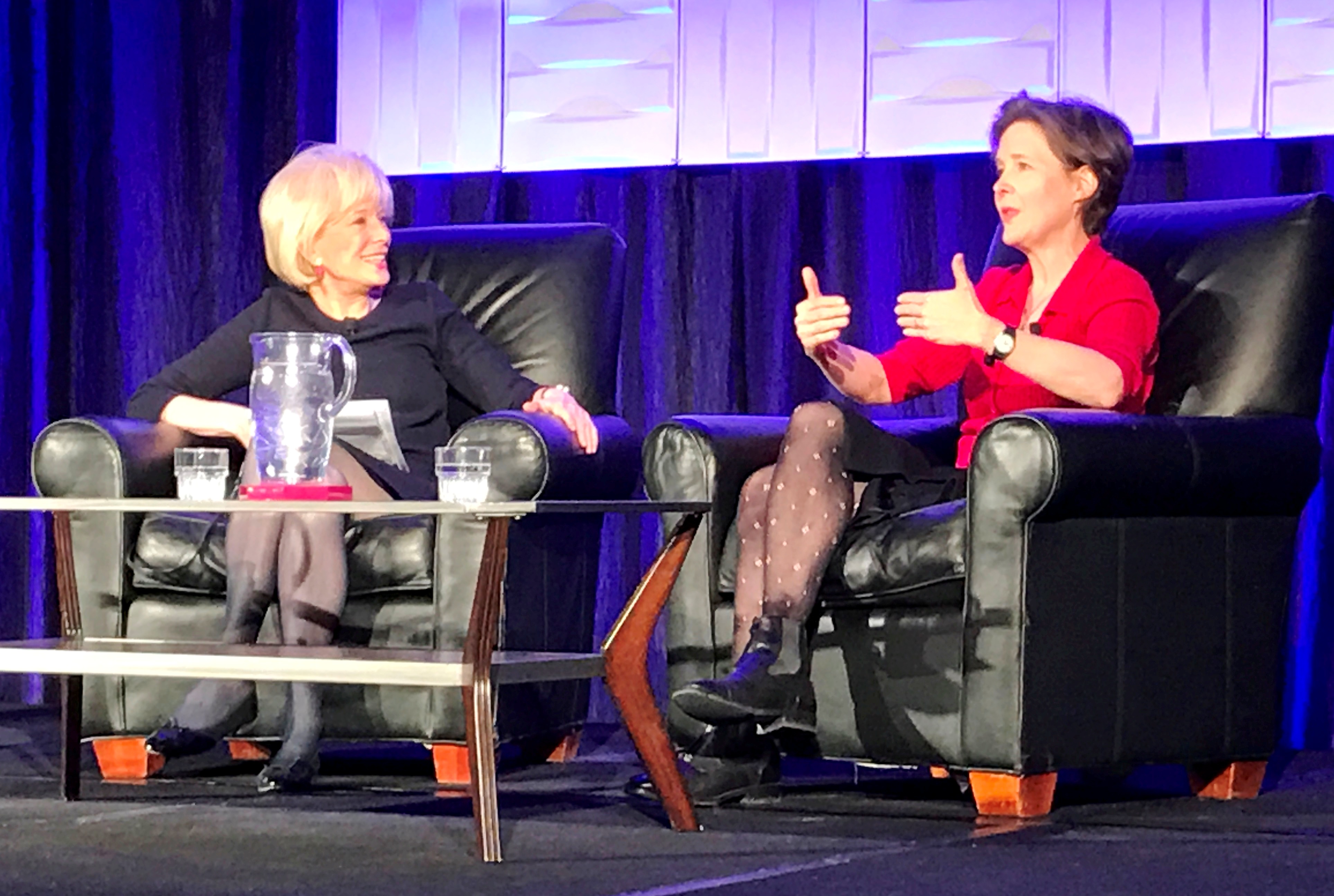Wi12: Calls for Diversity at ABA Town Hall
 Booksellers gathered Sunday afternoon for an energized, standing-room-only town hall meeting of the American Booksellers Association at Winter Institute 2017 in Minneapolis, Minn. By far, the largest topics of discussion were the need for greater diversity on the ABA board in particular and among booksellers in general, and a call for resources for stores looking to take political action, but other topics, including the viability of receiving health insurance from the ABA and the logistics of the invoicing system Batch, were also discussed.
Booksellers gathered Sunday afternoon for an energized, standing-room-only town hall meeting of the American Booksellers Association at Winter Institute 2017 in Minneapolis, Minn. By far, the largest topics of discussion were the need for greater diversity on the ABA board in particular and among booksellers in general, and a call for resources for stores looking to take political action, but other topics, including the viability of receiving health insurance from the ABA and the logistics of the invoicing system Batch, were also discussed.
Diversity and Political Action
Christin Evans, co-owner of the Booksmith in San Francisco, Calif., and a board member of Kepler's Books in Menlo Park, expressed dismay over the largely "business-as-usual" tone of the conference, given the political climate since the election and the protests surrounding the immigration and travel ban going on at the same time as Winter Institute. She said she had hoped for and requested panel sessions during which booksellers could discuss things like the Milo Yiannopoulous-Simon & Schuster book deal and ways to protest it (Evans added that her own store is cutting its S&S orders by about 50% and donating profits from other S&S titles to the ACLU), along with broader options for bookstores that want to serve as places of refuge or take a more activist stance. She asked that the ABA host at least one such panel at BookExpo this May and said it was "worthwhile for us to have a conversation about the role of the activist bookstore" in the Internet age.
 |
|
| The ABA Board at Wi12 | |
Denise Chávez, owner of Casa Camino Real Bookstore & Art Gallery in Las Cruces, N.Mex., proposed that the ABA board be diversified to include more people of color, and that some sort of advisory committee be established to help guide booksellers when they face discrimination or threats based on the ethnicity, sexual orientation or nationality of visiting authors, customers and staff members. "We daily deal with racism," Chávez said, offering to make herself and other booksellers "available in this time of challenge. We face these problems all the time. We could have a group of people who would be able to help all of you and help ourselves."
Two of the organizers of Indies Forward, Hannah Oliver Depp of WORD Bookstores in Jersey City, N.J., and Brooklyn N.Y., and Angela Maria Spring of Politics & Prose in Washington, D.C., took the floor to call for the ABA board to work actively toward having more people of color on the board; to encourage and recruit more people of color into the bookselling industry; to provide panels and education sessions on inclusiveness, diversity and hiring diverse staff; and to provide resources for stores that want to create safe spaces or take political action. [Ed. note: Indies Forward met the next morning to brainstorm and share actionable first steps for many of these topics; a report on that will come later this week.]
 |
|
|
Angela Maria Spring (l.) of Politics & Prose in Washington, D.C., and Hannah Oliver Depp of WORD Bookstores in Jersey City, N.J., and Brooklyn, N.Y., addressing the board on diversity.
|
|
Deandra Beard, owner of Beyond Barcodes Bookstore in Kokomo, Ind., recalled reaching out to African American bookstores around the country on her own when she was looking to open her own store. She wondered if the ABA was making efforts to reach out to black bookstores that weren't member stores and whether the association could help connect stores owned by people of color.
In response to calls for greater diversity on the board, board members implored ABA members to take part in the annual nominating process and to make sure they're reading Bookselling This Week to know when that will occur. "This needs to be grass roots," said Jamie Fiocco, owner of Flyleaf Books, Chapel Hill, N.C. "Help us diversify the board. The board is only as good as the nominations we receive." In regards to things like the Yiannopoulous book deal, ABA president Betsy Burton of the King's English Bookshop, Salt Lake City, Utah, reminded ABA members that, legally, if booksellers do discuss protests as a group, they cannot band together in any kind of fiscal way. And the next morning Burton announced that the board had met after the town hall meeting to discuss these issues and decided on two immediate points of action: the first is starting a diversity task force, and the second is to immediately expand the Bookseller Advisory Council--which meets twice a year--by five members, with an eye toward diversity. Burton thanked booksellers for bringing up "things that needed to be said," and for doing so "in the best way possible."
Health Insurance
On the subject of bookseller health insurance through the ABA, CEO Oren Teicher reiterated that the ABA has been trying for years and will continue to try, but there are difficulties, including the fact that the ABA membership is too small and too spread out across the country to garner competitive prices. The ABA is, however, looking into working with other independent business associations, such as the North American Retail Hardware Association, to see if together they can reach high enough member numbers and density. Teicher also noted that the current "uncertainty" surrounding the Affordable Care Act has made negotiations with health insurance companies more complicated, but the ABA will continue its efforts.
ABACUS
Noëlle Santos, owner of the Lit. Bar, a bookstore and wine bar that will open in the Bronx, N.Y., this year, pleaded for more indie booksellers to participate in the ABA's ABACUS surveys, calling the ABACUS data her "life line" for negotiations with property owners, lenders and banks. "I know it's a lot of work," said Santos, but the more booksellers participate, "the greater the chance that people like me, women of color, have of bringing books to urban areas."
Betsy Burton agreed, saying that in her opinion ABACUS is the "single-best tool that the ABA provides for us." She also pointed out that the surveys are confidential.
Batch
When asked about the financial and logistic implications of using Batch, an invoicing data system created for the Booksellers Association of the U.K. and Ireland that the ABA has been trying to bring to American stores, Oren Teicher stressed that the system is free, totally voluntary and does not affect any terms or agreements with particular publishers. Pete Mulvihill of Green Apple Books, San Francisco, Calif., reiterated that with Batch booksellers have "complete control of who you pay and when," but instead of managing dozens of different invoices and writing as many checks, everything is done in one place online. Teicher also noted that the ABA is testing the system with some major publishers and trying to bring others on board. --Alex Mutter





IPC.0204.S3.INDIEPRESSMONTHCONTEST.gif)






 The first annual WI Horse Invitational took place at 1:30 a.m. on the last night of the conference.
The first annual WI Horse Invitational took place at 1:30 a.m. on the last night of the conference. VHH, a regional bus company in Hamburg, Germany, has
VHH, a regional bus company in Hamburg, Germany, has  Lint Boy
Lint Boy Set in the fictional North Carolina mountain town of Old Buckram, The Barrowfields is a stunning debut novel rich in character and place, steeped in literature and music, and fraught with family drama. Raised in an old mountaintop mansion by his eccentric book collector/unpublished writer/lawyer father and supportive but overwhelmed mother, Henry Aster Jr. narrates the story from his perspective as a new lawyer. He left Old Buckram for college in Connecticut and law school in Chapel Hill, but could never quite shake his father's influence.
Set in the fictional North Carolina mountain town of Old Buckram, The Barrowfields is a stunning debut novel rich in character and place, steeped in literature and music, and fraught with family drama. Raised in an old mountaintop mansion by his eccentric book collector/unpublished writer/lawyer father and supportive but overwhelmed mother, Henry Aster Jr. narrates the story from his perspective as a new lawyer. He left Old Buckram for college in Connecticut and law school in Chapel Hill, but could never quite shake his father's influence. 